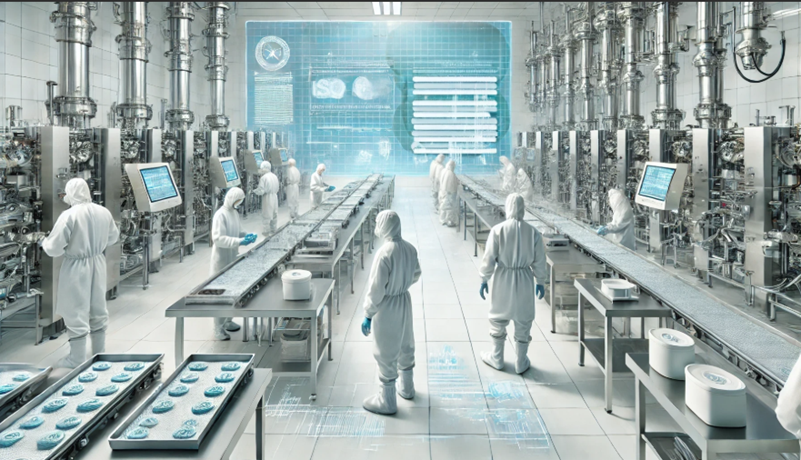
Food Safety in 2025: Trends in ISO 22000 Compliance
Food safety is evolving rapidly as consumer expectations, regulatory requirements, and technological advancements shape the global food industry. In 2025, businesses must go beyond traditional food safety measures to ensure compliance, protect public health, and maintain brand integrity.
At the forefront of this transformation is ISO 22000, the internationally recognized Food Safety Management System (FSMS) standard. As food safety risks grow, ISO 22000 compliance is becoming a necessity rather than an option for food businesses worldwide.
So, what trends will define ISO 22000 compliance in 2025? Let’s explore how businesses can stay ahead, ensure food safety, and drive consumer trust in an evolving market.
1. The Growing Importance of ISO 22000 Compliance
Food safety is a global concern, with increasing risks such as:
🔹 Rising foodborne illnesses due to poor hygiene and contamination
🔹 Climate change affecting food production and supply chains
🔹 Tighter regulations on food safety and traceability
🔹 Consumer demand for transparency in food sourcing
ISO 22000 compliance helps businesses:
✅ Mitigate risks and prevent contamination
✅ Ensure regulatory compliance and avoid legal issues
✅ Boost consumer confidence with globally recognized food safety standards
✅ Strengthen supply chain transparency and traceability
In 2025, ISO 22000 is more than a certification—it’s a competitive advantage for food manufacturers, restaurants, and retailers.
2. Key Trends in ISO 22000 Compliance for 2025
a) Digitalization of Food Safety Management
The food industry is embracing AI, IoT, and blockchain to enhance food safety compliance.
🔹 Smart sensors monitor food quality in real time
🔹 Blockchain ensures food traceability from farm to fork
🔹 AI-driven predictive analytics detect contamination risks early
By integrating technology with ISO 22000, businesses can ensure faster response times, real-time monitoring, and improved compliance tracking.
b) Stricter Regulations & Global Alignment
Governments are implementing stricter food safety laws, and ISO 22000 is aligning with:
✔ FSMA (Food Safety Modernization Act) in the US
✔ EU Food Safety Regulations
✔ Codex Alimentarius international food safety standards
Food businesses must update their FSMS regularly to comply with evolving laws and industry requirements.
c) Focus on Allergen Management & Food Labeling
Food allergies are increasing, and regulators are demanding stricter allergen control measures.
✔ ISO 22000 requires enhanced allergen management protocols
✔ Food labeling laws mandate clear ingredient disclosures
✔ Businesses must prevent cross-contamination risks
By 2025, food companies that fail to manage allergens properly may face legal action and consumer backlash.
d) Sustainable Food Safety Practices
Sustainability is becoming a key pillar of food safety compliance.
🌱 Reducing food waste through better inventory management
🌱 Using eco-friendly packaging that meets food safety regulations
🌱 Ensuring ethical sourcing of ingredients and raw materials
ISO 22000 now integrates with ISO 14001 (Environmental Management System) to promote sustainable food safety practices.
e) Strengthening Supply Chain Transparency
Food recalls due to contamination cost businesses millions and damage consumer trust.
✅ ISO 22000 now emphasizes supply chain traceability
✅ Companies must conduct supplier audits and ensure safety at every stage
✅ RFID tracking and blockchain help enhance supply chain visibility
By 2025, real-time tracking of food products will become the industry standard.
f) Food Safety Culture & Employee Training
ISO 22000 now requires a strong food safety culture at every level of an organization.
✔ Regular employee training on food handling and hygiene
✔ Workplace hygiene audits to prevent contamination
✔ Encouraging staff to report food safety concerns proactively
Companies that invest in food safety training will have lower risks of contamination and compliance failures.
3. How Businesses Can Ensure ISO 22000 Compliance in 2025
Step 1: Conduct a Food Safety Gap Analysis
🔍 Identify areas where your business falls short of ISO 22000 requirements
🔍 Evaluate current hygiene practices, supplier risks, and food safety hazards
Step 2: Implement a Digital Food Safety Management System (FSMS)
📌 Use AI-powered monitoring systems for temperature, hygiene, and contamination control
📌 Integrate blockchain for real-time supply chain transparency
Step 3: Strengthen Allergen Management & Food Labeling Compliance
✅ Update food labels to meet global allergen disclosure standards
✅ Train staff on allergen cross-contamination prevention
Step 4: Invest in Sustainable & Safe Food Practices
🌱 Optimize waste reduction and eco-friendly packaging
🌱 Ensure ethical sourcing and sustainability certifications
Step 5: Regular Audits & Continuous Improvement
🔍 Conduct internal and third-party food safety audits
🔍 Align ISO 22000 with ISO 14001 (sustainability) and ISO 45001 (workplace safety)
4. The Future of Food Safety & ISO 22000 Compliance
As food safety risks increase, businesses that prioritize compliance will gain:
✔ Stronger market reputation and customer trust
✔ Fewer product recalls and financial losses
✔ Global certification for international trade opportunities
The future of ISO 22000 in food safety will focus on:
🚀 AI-driven food safety monitoring for real-time compliance
🚀 Stronger sustainability and waste reduction initiatives
🚀 Complete supply chain transparency using blockchain
By adopting ISO 22000 trends early, businesses can future-proof their operations and stay ahead in the competitive food industry.
5. Conclusion: Why ISO 22000 Compliance is a Must in 2025
In the fast-changing food industry, ISO 22000 compliance is not optional—it’s essential. Companies that fail to meet global food safety standards risk:
🚨 Legal penalties and regulatory shutdowns
🚨 Loss of consumer trust and brand damage
🚨 Financial losses due to recalls and contamination incidents
On the other hand, businesses that embrace ISO 22000 compliance will thrive by ensuring:
✅ Safe, high-quality food for consumers
✅ Stronger supply chain partnerships and transparency
✅ Global recognition and long-term business sustainability
💡 Is your food business ready for 2025? Contact us today to implement ISO 22000 and stay ahead in food safety compliance! 🍽️✅🚀